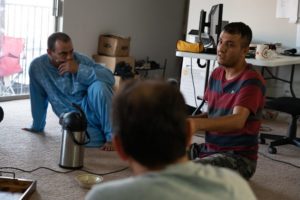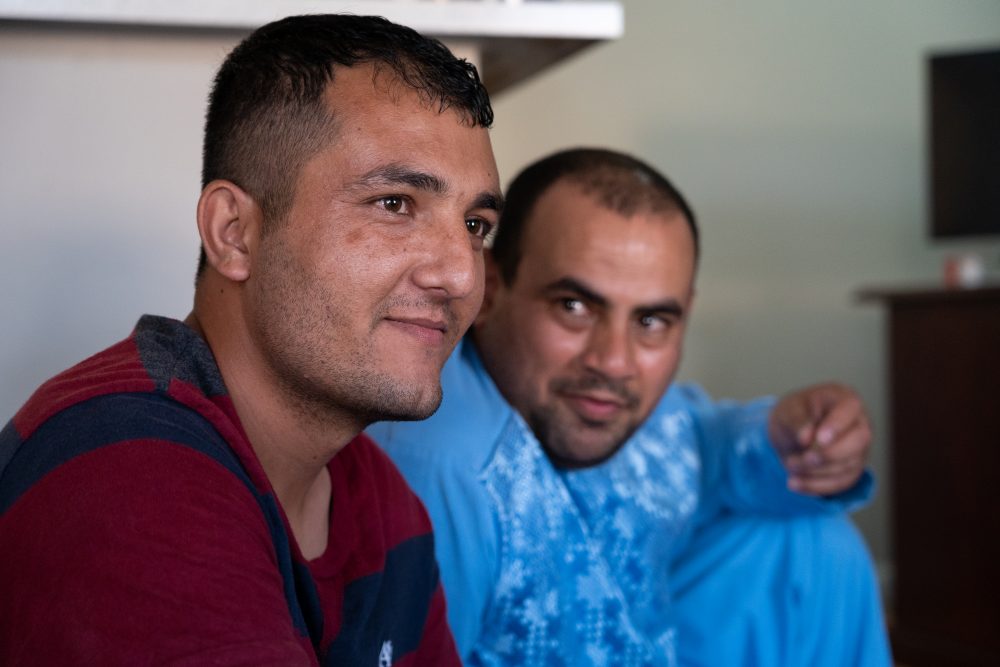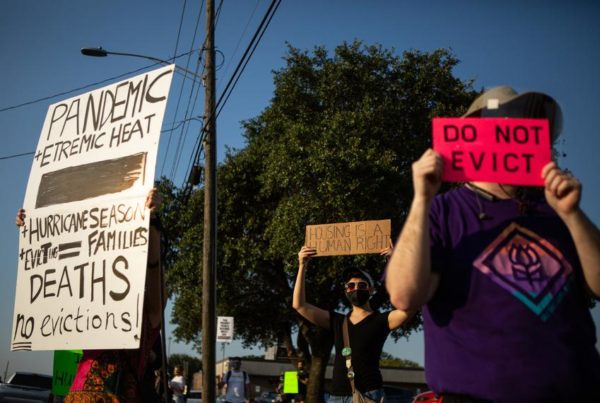Last week, a group of seven people from Afghanistan sat on a carpeted tan floor in a Houston living room, where one man poured hot green and black tea into assorted mugs.
All had moved to the city from Afghanistan in the last seven years. Most worked as interpreters for Americans or allied forces during the last two decades of armed conflict in their country — work that qualified them for a Special Immigrant Visa, or SIV.
“I was working with U.S. special forces. It took about almost four years to get my visa,” said Mohammad Eisa Qaderi, who is from Kapisa province, which he said is not a safe place for interpreters.
The tedious visa process has caused painstaking and sometimes deadly delays for thousands of Afghan interpreters and other workers. The visa complications threaten their lives even more as the Taliban takes territory in Afghanistan, and dangerous attacks are on the rise.
Qaderi said he has a few close friends struggling to get visas.
“We applied the same time,” Qaderi said. “It’s been two years that I’m here. They are still waiting on their approval.”
One of Qaderi’s friends is stuck in a Taliban stronghold, Kunar province, desperate to get out.
“Two days ago I talked to him,” Qaderi said. “He said ‘I cannot escape anywhere, I am stuck hiding in my house. I cannot go nowhere.'”

Afghan interpreters discuss the friends and colleagues they have back home, who have seen long visa delays as the Taliban regains territory in Afghanistan.
Lucio Vasquez / Houston Public Media
Evacuation efforts are underway for some qualifying Afghan allies with pending visas — NPR reported plans to evacuate the first 750 interpreters out of Kabul this week and into Virginia. Despite this, some interpreters are skeptical of the government’s plans, as the visa process has been riddled with complications and unfulfilled promises.
Qaderi said those allies deserve to be safe in the United States like him.
“All my friends should be here because they deserve it,” he said, “They work with me. We were shoulder by shoulder.”
Those who have succesfully relocated to the U.S. have formed a new community in Houston. According to data provided by the South Texas Office for Refugees, some 1,700 Afghan interpreters and their families have resettled in Houston since 2015.
Some of these interpreters said they were grateful to be in Houston, and found it to be a welcoming city. Yet they’re frequently reminded of danger back home. They’re contacted by former coworkers, friends and family, asking for help on how to get visas.
Interpreter Khalil A. Arab said an old colleague wants to flee the country, but doesn’t know where to start.

Mohammad Eisa Qaderi, a former interpreter for the U.S. military in Afghanistan, sits and drinks tea. [1:49 PM] Trovall, Elizabeth C
“Mohammad Eisa Qaderi said all of the people he worked alongside in Afghanistan for allied forces deserve to be safe in the United States.
Lucio Vasquez / Houston Public Media
Beyond processing delays, there are other fundamental barriers to the visa program, said interpreter Sayed Omid Ahmadiar. Many other Afghans — like plumbers, guards, cooks who worked for allied forces — don’t have access to even apply for a visa.
“There are a lot of people, they do not have email account, email ID, or they do not have Facebook, or they cannot speak English and they worked with coalition forces or American people and they are left behind,” Ahmadiar said. “I am worried about those people.”
But the danger is still real: Cooks or others who work with the U.S. military are perceived as traitors just like interpreters in combat, according to the interpreters. The Taliban has a reputation for hunting down and killing any people associated with allied forces.
As they sipped tea, the interpreters said they hoped the Taliban wouldn’t regain its control of the country, but some acknowledged it’s probably only a matter of time until the country slips back into their control.
Which is why, they said it’s even more critical that their friends are evacuated from the area as soon as possible.
“Honestly, the Taliban, they don’t know about the humanity. They kill anyone,” said Abdul Rasoul Tahiri. “(If you) only work with U.S. people, (it) doesn’t matter (if it was for) one day or two days or two years.”














